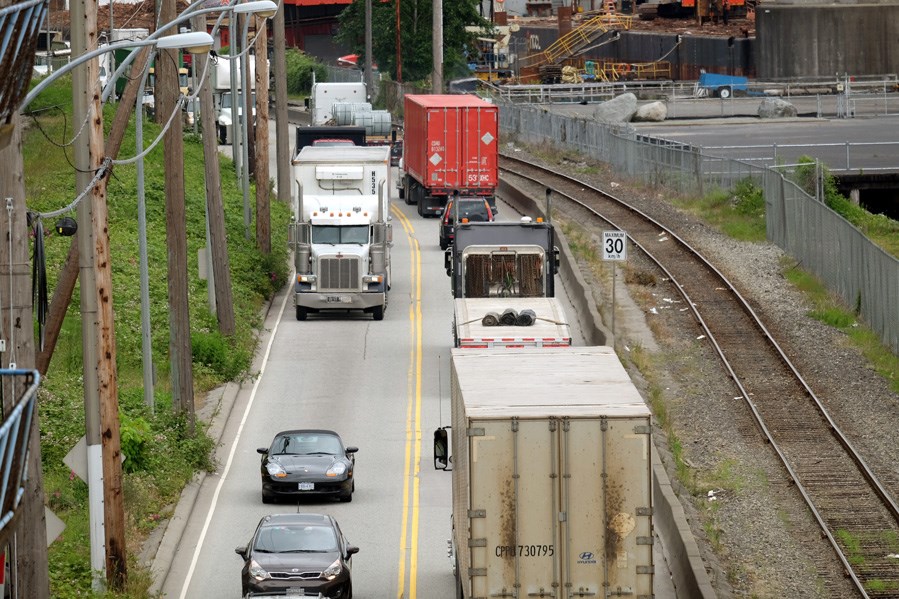The Mayors’ Council on Regional Transportation is driving forward with plans to develop a winning referendum question on transportation and transit.
The region’s mayors met at a closed meeting on Friday to discuss details and preparations for a referendum to fund transportation and transit improvements across Metro Vancouver.
“We made significant progress today, and look forward to continuing discussions next week with an eye to determining a referendum question for recommendation to the provincial government,” North Vancouver Mayor Richard Walton, chair of the mayors’ council, said in a press release. “I’d particularly like to thank the seven new mayors for investing the time to come up to speed on this plan so quickly and to the returning mayors for your ongoing work and commitment to help keep Metro Vancouver moving.”
New Westminster Mayor Jonathan Cote is among those seven new mayors on the council. The mayors’ council’s next meeting is taking place on Dec. 11 in New Westminster.
“It looks like the mayors’ council will be making a final decision on the referendum question and the funding source,” Cote told The Record. “That will be a public meeting. The mayors wanted the decision to be in public. Obviously we have been having discussion about the various options at our last meeting but we wanted to have the final decision on the referendum and the revenue source to be in that forum.”
Cote said the mayors’ council has been doing public surveys and focus groups on the three different potential revenues sources to find out which one resonates most with the public.
The three potential sources of funding being considered are: an increase to the existing B.C. carbon tax, which would be charged on fossil fuel purchases within Metro Vancouver; an increase to the existing provincial sales tax, which would be charged on PST-eligible purchases in the region; and an annual vehicle registration fee, or a combination of these options.
“One of the main driving factors that will ultimately be in the mayors’ decision is which one we feel will have the greatest chance of success in a referendum,” Cote said. “I think all the mayors, for the most part, are onside with the importance of this transportation referendum and it being successful for the future of the region’s transportation system. Cutting off new investments into the expansion of public transit and into our road network is the last thing our region needs and will have a negative impact on our transportation system, but will ultimately really negatively impact the economic competitiveness of the region.”
The mayors and the province have agreed that any new funding sources must consider: fairness to all taxpayers; affordability for families; balance between different sectors of the economy and society; link to transportation and transit system use and benefit; stability and resiliency over time; growth; and economic efficiency.
Prior to the upcoming meeting, Cote said the mayors’ council will get feedback from the province as to which of the three options it would accept.
“Certainly, the mayors do not want to be coming forward with a referendum question and a funding source to only have the province not be on board,” Cote said. “Those discussions will be happening this week. Certainly that will be another important component in the mayors’ decision on how to move forward with a referendum question and a revenue source.”
In June, the mayors’ council announced a 30-year vision for addressing transportation and transit needs in the region. Estimated to cost $7.5 billion, the plan would require some funding from federal and provincial governments, but would also require an additional $285 million per year to pay the region’s share.
Provincial legislation requires a referendum before the end of June to approve the new funding tool.
“Certainly, the initial information we are getting so far is indicating this is a very winnable referendum,” Cote said. “The people in Metro Vancouver have a recognition that we have some serious transportation problems in our region and we are going to need to make some investments. Having said that, with any campaign it’s about making sure you get the word out about the campaign and that people understand the issues at stake and are engaged and want to get out to vote. Of particular concern is getting out younger voters who generally are very supportive and understand the importance of investing in public transit, but tend not to get involved as much in local elections or in these types of referendums.”
Cote, who engaged in social media and new forms of connecting with people during his recent bid for mayor, said he is willing to do what he can to contribute to the referendum’s success.
The Mayors Council on Regional Transportation will be heading to New Westminster for its next meeting, which takes place on Thursday, Dec. 11 from 10:30 a.m. to 12:30 p.m. in the ballroom at Anvil Centre, 777 Columbia St. The meeting is open to the public.



